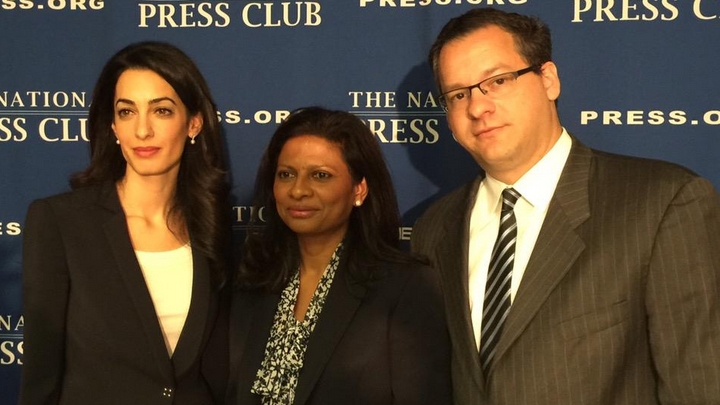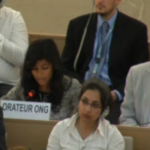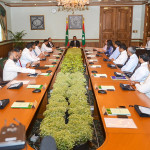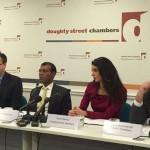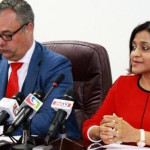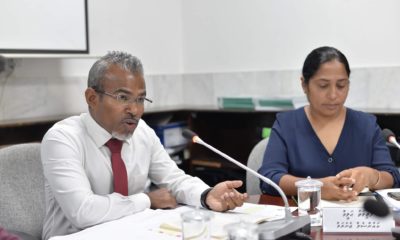After a UN rights panel declared his imprisonment arbitrary, former President Mohamed Nasheed’s high-profile international lawyers have launched a campaign seeking targeted sanctions against officials of the Maldivian state.
“Today we’re calling for governments around the world to impose travel bans and targeted financial sanctions against Maldivian government officials who have been implicated in serious human rights abuses,” Jared Genser told the press in London.
Genser, Amal Clooney, and Nasheed’s wife, Laila Ali, briefed the British press yesterday on the UN Working Group on Arbitrary Detention’s (WGAD) opinion, which said the opposition leader’s conviction in March was politically motivated and violated international law.
Despite engaging with the UN process and submitting a 111-page response, the government last week called the judgment “flawed and premature” and said it “will not be made to act on the basis of a non-binding opinion.”
Genser said the campaign will seek to “dramatically increase the cost” to the government for its refusal to release Nasheed.
In late April, the European Union (EU) parliament adopted a resolution urging the Maldivian government to release Nasheed and advising member states to issue warnings on the Maldives’ human rights record on their travel advice website.
Genser said the EU parliament is “looking at taking up another resolution shortly”.
He stressed that the lawyers are not seeking sanctions against the country or average Maldivians, but “only want to target those Maldivians who have been engaged in serious human rights abuses.”
Discussions are underway with governments across the world on travel bans, said Genser, who is the founder of Freedom Now, an NGO campaigning for the release of political prisoners.
The lawyers will travel with Laila to meet with “key policy makers” and “to ensure that wherever they travel Maldivian government officials are being pressed for the release of President Nasheed and other political prisoners”.
Laila and Amal Clooney appeared on CNN last night for an interview with Christiane Amanpour. Clooney is a London-based human rights lawyer, who shot to global fame with her marriage to Hollywood actor George Clooney last year. She recently represented jailed Al Jazeera journalist Mohamed Fahmy, who was pardoned by the Egyptian president in late September.
Genser meanwhile joined Laila on the BBC’s Newshour programme yesterday. The press conference also generated widespread coverage.
Nasheed was found guilty of terrorism over the military’s detention of Criminal Court Chief Judge Abdulla Mohamed in January 2012 and sentenced to 13 years in prison. The UN WGAD said the government was unable to demonstrate the legal basis for the terrorism charge.
President Abdulla Yameen had previously declared that the government will not bow to foreign pressure after renewed calls for Nasheed’s release from the US, the British Prime Minister, and the UN human rights chief.
Last month, the government hired Washington’s most prominent lobbyist firm, Podesta Group, to “provide strategic counsel on strengthening” the Maldives’ ties to the US government. The opposition said the decision was prompted by the prospect of facing sanctions.
Genser meanwhile explained that while financial sanctions against individuals become public knowledge, travel bans are generally not known publicly and reported by the media.
“There’s a lot that’s going to happen that you’re not actually going to see happening, but that the government of the Maldives will experience,” he said.
Individuals placed on travel ban lists will either have existing visas revoked or be denied visas to travel.
“We’ve already begun a range of conversations with governments around the world to start moving expeditiously in this direction,” Genser said.
“Beyond travel bans and targeted financial sanctions, we’re also moving aggressively to initiate important discussions in multilateral institutions that address human rights to increase the visibility of what’s happening in the Maldives, to elevate pressure in the government for action, and to create permanent independent monitoring mechanisms that will hold the government to account for its rights abuses.”
Nasheed’s case is not the only justification for sanctions, but “rather the impunity with which the government has engaged in a broad range of abuses in recent years,” Genser said.
Clooney said Nasheed’s imprisonment is “emblematic of a bigger crisis in the country, where the noose around free speech is tightening by the day and where a fledgling democracy is entering a much darker period of repression.”
Laila meanwhile told the press that she has never been engaged in politics.
“But now my husband has been silenced, I feel compelled to speak out on his behalf. And every time I speak to him, he tells me the same thing: this isn’t only about him. It’s not only about his sentence. It’s not only about his predicament,” she said.
“The leadership of the entire political opposition is either in jail, or under threat. And there are some 1,700 other people facing serious charges for their non-violent activism.”
Laila said the Maldives has “returned to its dark past” with the family of former President Maumoon Abdul Gayoom back in power. A journalist disappeared last year, she noted, and a member of Nasheed’s legal team was stabbed in broad daylight last month.
Nasheed was jailed more than a dozen times during Gayoom’s 30-year reign.
“The regime has tried to break him so many times. But they’ve never succeeded. And I’m confident they won’t succeed this time,” she said.

